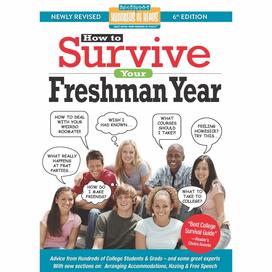Alison Leigh Cowan ’82 Compiles Tips to Navigate College Life

That’s why, in 2004, Yadin Kaufmann ’80 and Mark W. Bernstein published How to Survive Your Freshman Year (Hundreds of Heads Books), a collection of tips from hundreds of college students across the country. It’s part of why, 15 years later, the book is going into its sixth edition.
The latest version, edited by Alison Leigh Cowan ’82, addresses timeless concerns such as what to pack and how to deal with roommates. Laura Wolter from University of Texas at Austin suggests using “Mom’s laundry detergent and fabric softener to make your dorm room smell a little bit more like home!” J.T. from the University of Florida advises caution when buying used books, as “the person who had the highlighter before you may have been an idiot.”
The new edition also sheds light on concerns specific to Gen Z’ers. Cowan hired freelancers at different universities to gather perspectives on timely issues including the proliferation of prescription study drugs, the hazards of free speech, and sex and dating in the #MeToo era.
“If you are too drunk to be writing a coherent text to your mom,” says one Dartmouth student, “you’re too drunk to hook-up with anyone.”
The book features advice on how to cope with stress and anxiety and how to obtain disability accommodations. Contributors acknowledge the hazards of Greek-life hazing and phone addiction. One warns of the high-tech methods schools now use to identify cheaters.
Not all of the book’s content is so heavy. One contributor heralds the rise of emotional support animals. Another recommends arriving early to therapy-dog events because “a lot of people go, and one person can hog the dog.” The book tells where on campus to go for free swag, and it reviews various unconventional alarm clocks — including one that doubles as a vibrator.
All told, the new edition offers about 1,000 nuggets of wisdom from over 200 campuses. More than 40 of these anecdotes come from current Princeton students or alumni. CNBC producer Louise Connelly ’15 uncovers the highest-paying gig on campus: posing nude for drawing class. (The Lewis Center recently offered $33 an hour for this.) Former White House Press Secretary Mike McCurry ’76 recalls serving as resident adviser to a rambunctious freshman who later became writer and producer David E. Kelley ’79.
With pithy insights like these, and illustrations by New Yorker cartoonist Lisa Rothstein, the most recent edition of How to Survive Your Freshman Year is an entertaining read even for those who vacated their freshman dorm rooms long ago.
The editor:
Alison Leigh Cowan ’82 worked as a reporter and editor for the New York Times for 27 years, during which time she published more than 1,700 articles. Before joining the Times she earned an MBA from Harvard and was an editor at Business Week. Since leaving the Times in 2014 she has pursued independent writing projects.
Opening lines:
First off, congratulations on the exciting days ahead and on being one of nearly 2 million lucky souls to be starting college this year in the United States. You’ve worked hard to get this far, and you have every reason to feel proud.
We know you’re anxious. You’re not wrong to think that college is harder today than it was when your parents and teachers may have attended. Certainly, it is more nerve-wracking than the zany days when Lisa Rothstein, the book’s illustrator, and I each settled in to our first dorm rooms. (Lisa with her art posters, me with my electric typewriter.) The art of the job hunt has changed. Stress is lurking everywhere, and the glare of social media only magnifies the pressure to be perfect, one reason why we created an all-new chapter in this edition all about “Coping.”
But here’s a secret the elders in your life may not appreciate. The Straight-A Life is highly overrated. Success depends on so much more than compiling that perfect GPA, as new research keeps finding. Failure has never been more fashionable — or helpful to your career. Robert F. Scott’s perpetual daydreaming may have made him look lackluster as a student, though that same restless curiosity about what lay beyond his classroom walls also led him to Antarctica. Steve Jobs’, George W. Bush’s, and J.K. Rowling’s spotty grades in college never held them back, either.
So, remind yourself to breathe, and give yourself permission to have some fun. College may or may not be the best four years of your life, but for sure it shouldn’t be the dullest, either. Sample new foods. Make some unlikely friends. Try out for an extracurricular group you think is way out of your league. You may surprise yourself (and the doubters back home who said you never could.) I tried out for an a cappella group, which quickly showed me the door. (To this day, I can’t even believe the group did not burst out laughing upon hearing my first off-pitch note.) But I also auditioned for a dance troupe that I was sure I had no chance of making, only to be stunned when I got in. That ended up being one of the more thrilling experiences of my college years.
By all means, take basic statistics because it’s good for you, and maybe a course in computer coding. But mostly take the courses that interest you. Yes, even philosophy majors can land big jobs out in the real world. Just ask Robert Rubin, the former Treasury Secretary who credits the time he spent studying philosophy at college for much of his success. Or Megan Rooney, the classics major who went on to write speeches for the White House. Challenge yourself, when you can, but if a subject proves too much, take it pass-fail. Worry less about having all the answers, more about asking the best questions.
Oh, one more thing. Try not to leave college without getting to know some professors. To their credit, most American colleges encourage this kind of up-close exchange. Take advantage of all those office hours. (Wish I had.) Your teachers could end up being your greatest mentors and champions.
Most of all, relax.
This book has your back. Hundreds of people have generously drawn from their experiences so you have the benefit of that. The chorus of voices you’ll hear in the book will not always be singing in perfect unison (any more than I was years ago.) But the multiplicity of views represented will help you make more informed choices and take on ticklish situations with fewer surprises. Meanwhile, we’ll be continuing the conversation over at www.HowISurvived.com. So, please check us out there, too. We’d love to hear about your new adventures and what’s on your mind.
—Alison Leigh Cowan
Reviews:
“This has it all: good solid advice for new college students, with suggestions on tutoring and entertaining jokes to help you get through some of the sobering wisdom about sex, drugs and rock ’n’ roll. Delightful cartoons, funny and useful quotes from real college students and a light-and-bright cadence make this one of the best guides on the college experience.”
—Sheryl WuDunn *88, Pulitzer Prize-winning journalist












No responses yet